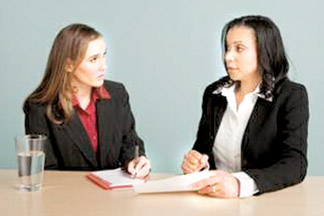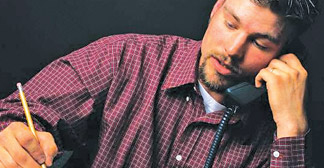|
More tips on telephone interviews:
Politeness is the buzzword when giving a buzz
Gaston de ROSAYRO
We discussed the importance of telephone interviews in our session
last week. We weighed the pros and cons of the advantages and snares it
might entail. We observed that while being an invaluable tool of
communication for any journalist trying to beat a deadline the telephone
must be used in an appropriate and courteous manner.
|

A face to face interview |
We also stressed that proper telephone etiquette is an essential
feature of any journalist's arsenal. Today we continue our discourse on
the subject from where we left off last week while elaborating on a few
more salient points which focus on its efficacy without being offensive.
It could be possible that you may interrupt people at inconvenient
times when you use a telephone. You must use the phone efficiently, so
that you use as little as possible of your interviewee's time. Think
before you make the call. Exactly what information would you need from
this person.
If you ask for information which you could easily have obtained
elsewhere, then a busy person might well get cross with you - and
rightly so.
The timing of a telephone call is vitally important as well. If your
deadline permits, try not to phone too early or too late in the day.
People are not usually at their best within one hour of starting their
day's work, and within half an hour of lunch they will not want to be
bothered.
|

Being clear and polite over the phone |
People are very often late back from lunch, and again do not want to
get a call within half an hour of the end of their day's work.
If you can, call at the best times in between - mid-morning or
mid-afternoon - you are more likely to be helped. If you want to phone
someone at home, do so as early in the evening as possible - people do
not like having to be disturbed at dinner or get out of bed to answer
the phone.
Whenever possible, find out the name of the person who can help you.
The receptionist - if approached politely - might help you. You might
ask her: "What is the name of the person in charge of security, please?"
Or you can pretend to know the name, but have forgotten it: "Can I
please speak to ... oh, what's his name? The person in charge of
security? Mr...?" "Mr Marasinghe?" "That's it! Mr Marasinghe."
|

Being clear and polite over the phone |
Having a name to ask for can save you from being transferred from one
person to another and often ending up after half an hour at square one
back with the person you first spoke to.
Always try to start at the top if possible. Try to talk to the boss -
he is often more willing to talk to the press than more junior people
are. He knows the answers and he usually understands the importance of
journalists getting a story about his company or department right.
Even if he does not have time to speak to you, it can be useful to
make that contact first. For example, if you have called the managing
director, and he refers you to somebody else in his company, then you
can say to that person quite honestly: "I was just speaking to your
managing director and he said I should speak to you." He cannot now
refuse, if his boss says he must speak to you.
When we interview someone face-to-face, we can see from the look on
their face, or the gestures which they use, whether they are serious
about what they are saying, or whether they are being funny, or
sarcastic. When you use the telephone, you have only their voice to get
this information - and it can alter the meaning of what they are saying.
Feed back what they say, to make sure you have understood it properly
in the way they meant it. You may not realise it but a smile does show
in your voice. If the person at the other end of the telephone line can
sense that you are smiling, that you are polite and positive, you will
get a much better response.
In a face-to-face interview a short pause can sometimes help by
making the interviewee feel he must continue speaking. In a telephone
interview it does not help.
|

A telephone interview |
If there is silence, then the person on the other end of the line
seems to have disappeared. Your interviewee may well think that the
interview is over, and hang up. Keep the conversation flowing, even when
half your mind is reading back over your notes of what has already been
said.
It is helpful, too, to remind the interviewee from time to time that
you are there and that you are listening. While he is speaking, you may
say "oh yes" or "really?" or even grunt one of those little noises that
shows you are listening and interested.
This does not apply, however, if you are recording an interview for
radio - the reporter's grunts will become very annoying to the listener
when the interview is broadcast.
Thank the interviewee. Check whether it would convenient if you could
call back if you need more information. If it is appropriate, ask if a
photograph can be taken.
Politely say goodbye. Using a telephone has many advantages, but it
also has its problems. These include the impersonal and inhuman nature
of the telephone, the difficulty of knowing the situation you are
phoning into, and the problem of clarity.
Telephones are most effective when you call somebody you already
know. If you can visualise the person at the other end of the line, you
can talk more easily to them. Try not to use the telephone to interview
somebody you do not know.
Do not be lazy, and use the telephone just because you cannot be
bothered to walk 100 metres. The telephone is always second-best to a
face-to-face interview, because it is impersonal.
When you phone a busy person, you will almost certainly be
interrupting them from doing something. Busy people do not sit around
doing nothing, waiting for the phone to ring. It is difficult to know
the situation you are going into.
Is your interviewee angry or frustrated, worried, miserable or happy?
It is a good idea to start a telephone interview by asking: "Is this a
convenient moment to ask you a couple of questions?"
Telephone lines are not always as clear as we would wish. A poor
quality line can make communication difficult. Also, a strange accent is
even harder to understand on the telephone than it is face-to-face,
especially when one or both of you are working in a second language.
Remember that it is as hard for your interviewee to understand you as
it is for you to understand your interviewee. Make it as easy as
possible by speaking loudly, slowly and clearly, with the telephone
mouthpiece in front of your mouth and not under your chin.
In summary: Remember that a face-to-face interview is always better
than a telephone interview.
When you must use the telephone, use it properly. Be clear and polite
to everyone on the telephone, however annoying they might be. Record
your interview properly and check you have all the information you need.
[email protected]
|



